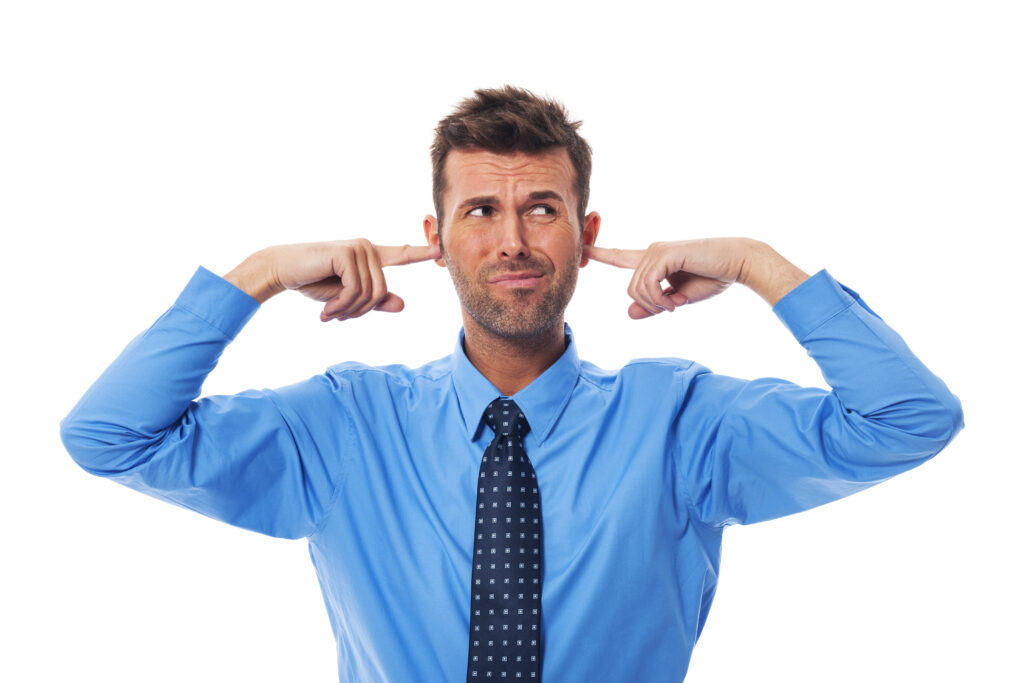Everyday choices you make now could irreversibly diminish your hearing and place you at elevated risk of ultimately developing dementia. If you think you’re too young to be concerned about your hearing, think again.
I grew up riding mini-bikes and go-carts. In my teens, I used a chain saw and a lawnmower on landscaping jobs. As an adult, I went to concerts and car races. When the first portable personal cassette player, the Sony Walkman, came out in 1979, the unit’s headphones became my cranial appendage. Never did it occur to me that engaging in these activities might be risking my hearing, not to mention my future cognitive health. Yet before age 50, I was diagnosed with hearing loss, and today I endure persistent tinnitus or ringing in my ears. Now I go to great lengths to protect the hearing I have left, and there’s a good reason you should do the same.
According to the World Health Organization, hearing loss – even in teens – is on the rise worldwide and with profound consequences. Tinnitus, a symptom of damage to hearing, now affects 1 in 5 American adults in their lifetime. For the 48 million Americans who suffer from it, hearing loss may do more than compromise quality of life and lead to social isolation. Depending on its severity, it may also raise the risk of future dementia two- to five-fold.[i] Those with untreated hearing loss also tend to experience cognitive decline earlier than individuals with normal hearing. A study by scientists at Johns Hopkins University enrolled 639 adults who were considered cognitively healthy but had various amounts of hearing loss. The subjects were followed for 12 to 18 years. Compared to a person with normal hearing, those who had even mild hearing loss at the start of the study had double the risk they would develop dementia. Subjects with moderate hearing loss at the start of the study were three times as likely as those with normal hearing to develop dementia. Individuals with severe hearing loss were five times as likely to develop dementia.[ii]

How Does Hearing Loss Lead to Dementia?
Using sophisticated brain imaging technology, scientists have found hearing loss causes the brain to shrink at an accelerated rate, especially in the region called the auditory cortex. Without stimulation through sound processing, this part of the brain diminishes over time, just as a muscle will shrink from disuse. Experts theorize that with loss of hearing the brain endures a greater “cognitive load,” meaning it must work much harder to decipher sounds and make sense of language. This can result in stress or “brain fatigue.” Further, some neuroscientists believe that when the brain must direct more resources to deciphering sounds, this drains from the resources used to consolidate and encode new memories. Finally, hearing loss often causes an individual to become socially isolated, and socially withdrawn people are at greater risk of dementia. This may be because without a strong social network people are at greater risk of becoming depressed, and depression itself is a known risk factor for Alzheimer’s disease.
The good news is that treating hearing loss not only helps with hearing, it helps with brain health, too. Unfortunately, only about 20 percent of Americans with hearing loss get diagnosed and treated, and those who are treated wait, on average, seven years before seeking care. Some struggle with or even hide their hearing loss rather than admit that they are having trouble. Even after they get assessed, they may wait an additional 10 years before they get fitted with hearing aids. Dr. Timothy Teague, an audiologist, notes that many patients feel ashamed or embarrassed to wear hearing aids due to the social stigma of hearing loss. This may be partly why one study found that two years after purchasing them 24 percent of subjects had yet to use the devices.
Don’t wait. Delaying treatment for hearing loss means missing a critical window for minimizing negative brain changes and preserving cognitive health. Evidence shows that hearing aids, cochlear implants, or neuroprosthetic hearing devices can improve cognitive function and mental and emotional health; increase frequency and quality of social engagement; and raise self-esteem.
Researchers at the University of Melbourne assessed 100 adults aged 62–82 for degrees of hearing loss, cognitive function, speech perception, level of physical activity, sense of loneliness, and mood.[iii] Each was then fitted with hearing aids. After 18 months, 97 percent of participants experienced significant improvements in cognitive health, including their ability to plan, organize, and initiate tasks. They also showed improvements in working memory, which is used for reasoning and decision-making.
In a study of patients receiving cochlear implants, 81 percent of participants showed improved cognition after one year.[iv] There was also a significant reduction in the number of participants testing positive for depression compared to the number who tested positive prior to surgery.
It’s Never Too Soon to Protect Your Hearing
Contrary to common belief, hearing loss can occur relatively early in life. For example, a surprising one in five American teens is estimated to have already suffered some degree of hearing loss, primarily due to playing loud music through earbuds, and the problem, especially in teens, is worsening.

Another relatively young group affected by hearing loss is members of the military. About 2.7 million military veterans who served in the Iraq and Afghanistan wars are receiving disability compensation or treatment for hearing loss related to their service. The Veterans Administration says an additional two million suffer from tinnitus. For soldiers, the risk comes primarily from aircraft, missiles, tactical vehicles, small-arms fire, and improvised explosive devices (IEDs), all of which can damage the auditory sensing part of the brain. Also, head trauma from shrapnel and shock-wave blasts generated by rocket-propelled grenades (RPGs) and land mines can cause damage to the central auditory cortex in the brain or rupture the membrane of the cochlea, the spiral-shaped cavity of the inner ear that converts sound vibrations into nerve impulses.

How Does Loud Noise Cause Hearing Loss?
Hearing loss begins with damage to tiny auditory hair cells in a part of the ear called the cochlea. These cells convert sound into electrical impulses that get transmitted to the brain. Loud sounds can overburden the hair cells to a point at which they can no longer send information to the brain and they die. Although a single loud sound can cause instant and permanent hearing loss, for most people the loss is gradual, cumulative, and, for a period of time, imperceptible. Three factors determine whether a noise poses a risk: the level of a sound, the proximity of the sound, and the duration of the sound. Generally, the closer we are to the source of the sound, the longer we are exposed to the sound, and the louder the sound, the greater the risk to our hearing.
Other Causes of Hearing Loss
Some hearing loss and tinnitus, both temporary and permanent, can be triggered by the use of prescription drugs such as quinine, chloroquine, and hydroxychloroquine. Most commonly these medications are used prophylactically against malaria. However, they are also used off-label to treat lupus. Hydroxychloroquine was temporarily approved for emergency treatment of COVID-19 in 2020, even though its efficacy for this purpose was called into question. The class of antibiotics known as aminoglycosides are also associated with hearing loss, as are platinum-based chemotherapy drugs. All drugs prescribed for erectile dysfunction are now required to carry a warning about sudden hearing loss, as is a drug called Revatio, used for rare hypertension of the pulmonary arteries, because it shares the active ingredient used in Viagra. Some over-the-counter pain relievers (NSAIDs), when taken in doses of 8–10 per day, may cause reversible hearing loss in some individuals. In addition to medications, illnesses such as meningitis, shingles, and even diabetes can lead to hearing loss. Yet the majority of loss is caused by exposure to loud noise.

Protect It or Lose It
Commonly used home appliances and tools may exceed a safe decibel level and could place your hearing at risk if you do not use appropriate protection. Even running a hair dryer at high speed every day may be gradually diminishing your hearing. Likewise, a carpenter may think nothing of using a circular saw on the job, but the noise it produces far exceeds the safe limit for preserving hearing. If you live in a city, you may have grown accustomed to the frequent passing of emergency vehicles. Yet their sirens can pose a serious threat to your hearing. The blender I use for my daily smoothies is effective and convenient, but it’s also tormentingly loud and obviously exceeds a safe decibel level. To protect the precious hearing I have left, I wear industrial ear muffs when I operate the blender or other loud equipment and tools.
Are Movie Theaters Too Loud?
For years it seemed to me that the sound in movie theaters was getting increasingly louder. Turns out I’m not alone in this perception. Theater sound systems have become increasingly sophisticated and elaborate over the last couple of decades, with speakers and subwoofers behind the screen, speakers lining the right and left walls, and speakers in the back wall. Moviegoers are literally enveloped by sound. While these sound systems achieve their intended effect of heightening the sense of realism and engaging the moviegoer more fully, the American Hearing Research Foundation believes there is a legitimate concern that they may be contributing to hearing loss. Sound levels in theaters have been measured at 98 to 133 decibels, greater than the sound produced by a passing train or a jet taking off.[v] Even dialogue sequences have been measured at 85 decibels. (85dB is considered the safe upper limit.) In 2020, growing complaints led lawmakers to introduce legislation that would regulate sound levels in theaters. Not surprisingly, the Motion Picture Association of America does not welcome the bill and says that it would violate the First Amendment right to freedom of speech.

How Loud is Too Loud?
Generally, sounds above 85dB are harmful, but proximity and duration may make lower decibel sounds harmful as well. Sounds over 120dB can cause immediate and permanent damage to hearing. A whisper is about 30dB. A normal conversation is about 60dB. Following is a reference list for things that may expose you to unsafe sound levels.
- Audio headphones (85–110dB)
- Racing cars (up to 140dB)
- Concerts, sporting events, movie theaters (94–120dB)
- Emergency vehicle sirens (120–130dB)
- Fireworks (140–160dB)
- Food processors, blenders (88dB or greater)
- Gunshots (140dB)
- Hammering (20–140dB)
- Hairdryers (90dB)
- Highway traffic (70–80dB, at a distance of 50 feet)
- Lawnmowers, leaf blowers, and other gardening machinery (95–115dB)
- Shop machinery/power tools (80–110dB)
- Vacuum cleaners (75+dB)
- Circular saw (100dB)
- Subway trains (80-100dB)

The best thing to do is avoid risky sound environments all together. Otherwise, always use appropriate ear protection, such as foam earplugs or headphones, around excessively loud noise. In the absence of such devices, cover your ears with your fingers until the sound has subsided. I keep individually wrapped foam ear plugs in my car and coat pockets so that I always have them on hand should I find myself near sound levels that pose a threat.
There are a number of free apps, such as the National Institute for Occupational Safety and Health Sound Level Meter, Decibel X, and Too Noisy Pro, that let your smartphone measure sound levels in theaters, concerts, restaurants, and other locations.
The telltale signs of hearing loss include frequently asking other to repeat what they have said, turning the television up to hear broadcasts, and ringing in the ears (tinnitus). Even without signs of hearing loss, adults should get their hearing checked every ten years until age 50 and every three years after that. Remember, the sooner loss is confirmed, the sooner you can get treated and protect your cognitive health and your quality of life.
_________
Joseph Keon is the author of four books, including the forthcoming, The Alzheimer’s Revolution
[i] Deal, J.A., et al., “Hearing impairment and incident dementia and cognitive decline in older adults: The Health ABC Study,” The Journals of Gerontology 2016; (published online April 12.) DOI:10.1093/gerona/glw069
[ii] Lin Fret al., “Hearing loss and incident dementia,” Archives of Neurology 68 (2011):214-220. doi:10.1001/archneurol.2010.362
[iii] Sarant, Julia, et al., “The Effect of Hearing Aid Use on Cognition in Older Adults: Can We Delay Decline or Even Improve Cognitive Function?” Journal of Clinical Medicine 254 (2020) DOI: 10.3390/jcm9010254
[iv] Mosnier, Isabelle, et al., “Improvement of Cognitive Function After Cochlear Implantation in Elderly Patients,” JAMA Otolaryngology Head Neck Surgery 141 (2015):442-450.
[v] Warszawa A, Sataloff RT. Noise exposure in movie theaters: a preliminary study of sound levels during the showing of 25 films. Ear Nose Throat J September 2010.






